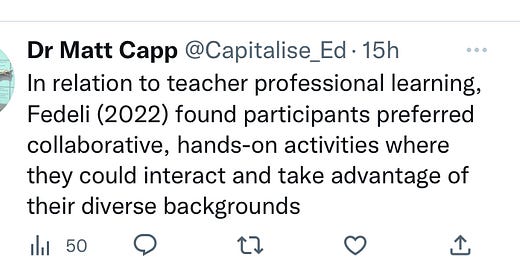Is teaching actually a collaborative profession?!
To me, it seems like it’s not the majority of the time.
I was enjoying my summer break, and it occurred to me that perhaps the aphorism that ‘teaching is a collaborative profession’ is rather trite and not as steeped in reality as it may appear.
I’d let this idea sit to one side when I received an email from the OECD’s GTI (Global Teaching Insights), a group working to provide additional real-world insights into international teaching. It contained a list of myths that need addressing to improve the status of teaching - as something of an aside, I’ve been reminded I appeared on a webinar alongside Susan Hopgood and Andreas Schleicher for this group, which can be viewed on demand here.
But here are the myths as provided:
Teachers work less hours than other professionals
Teachers work only in the classroom during classes, the rest is free time for them.
Teachers are only motivated to work at schools by long summer holidays.
Teaching is a very stable job, and it is difficult to fire teachers.
Those who can, do, those who can't teach, or, teaching is easy.
Teaching attracts people with less ambitions and skills.
Teachers are not into innovation, and they don't like to learn.
And this pearler:
Teaching is a solitary job and doesn't require collaboration.
This summarises the pertinence of this idea, it’s everywhere and widely agreed upon. As with most things of this sort, as a contrarian, I tend to disagree.
Looking at the raw numbers, as a teacher I spend the vast majority of my time teaching students in a classroom. I then have a small number of hours free from this duty, which I spend to prepare content for the above classes. The remaining time is spent on roughly two hours of meeting where I’m theory collaboration occurs, but more often a meeting takes place where collaboration isn’t necessarily required, though listening and nodding is.
Now personally I love to collaborate, I find it core to my nature, though admittedly on something of an elitists in this respect. I’d much rather collaborate with one highly committed teacher than a thousand less committed educators. So it makes me wonder why collaboration without a question of quality or effectiveness is so persistent and accepted within our profession.
It makes you wonder, when was the last time you collaborated with colleagues and found it highly beneficial? Overwhelmingly the work of teaching is solitary and indeed rather lonely on the whole, weekends committed to marking and so forth. Team teaching and the like are relatively rare and as such solo teaching and isolated working remains the norm.
I notice a clear difference here between the truth of practice and the accepted myth noted here. It makes me wonder which of the other myths are also worth giving a closer consideration?
Now taking a future focusesd mindset, would I like to be paid to collaborate? Absolutely, but to be completely honest it would likely take some getting used to, because it’s really not that common, or atleast it’s not my primary way of working. I’d assume this is true for most educators, we are most accountable to students and much less so to others. But collaboration sounds useful broadly speaking, though in the granular and the specific perhaps not?
Also, why is there such a large gap? Is collaboration perceived as a female practice? Or trait? Where does this assumption come from? Does it serve teachers? Or someone else? Much to consider and much to pursue further, as always any thoughts or insights welcome.
Running word count: 70,454





The 4 c's of the 21st century skills we should now be imparting to students includes 'collaboration' along with creativity, communication and critical thinking. So it makes sense that teachers should collaborate and work together as much as possible to ease one another's workload and demonstrate collaborative work. I personally love teamwork and love hearing alternate views to my own and my thinking challenged but I also love if I am able to assist and advance someone else's knowledge and skills from my own experience. A teacher need not be a solo performer, who does everything. There is no 'I' in team! I'm looking forward to view the linked video as well!
Preach! I see a lot of 'cooperation' in teacher life - e.g. sharing resources, covering classes. Also 'communication' and 'community'. But collaboration...I'm with you: nah. You need to form a trusting relationship with someone else, and have time to work with them in ways that best utilise both/all your traits, to collab. Some teacher activities do involve collaboration, but when I try to name them they are arts-based or project-based e.g. putting on the school musical; coordinating the sports carnival. I find day-to-day classroom teaching to be very solitary, especially in staffrooms where teachers bolt out the door at 3pm (I'm now one of these because I have kid/home duties), leaving little time to talk. I bet the answer is different in small schools, but I've only ever worked in big.